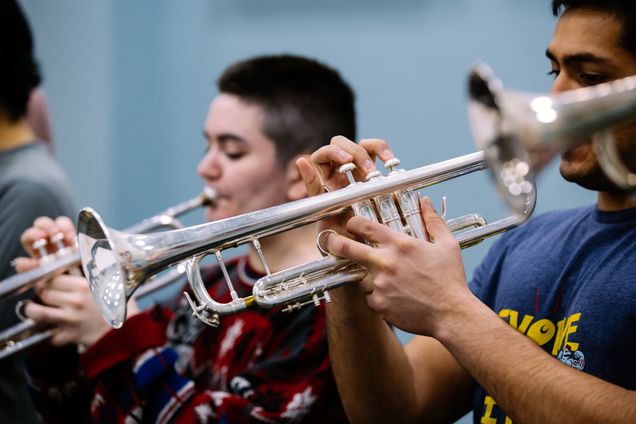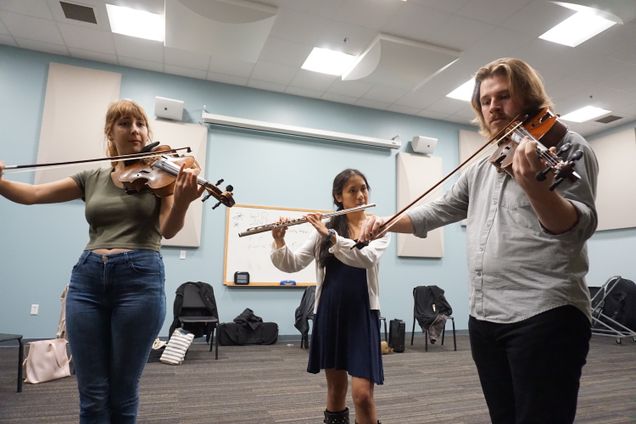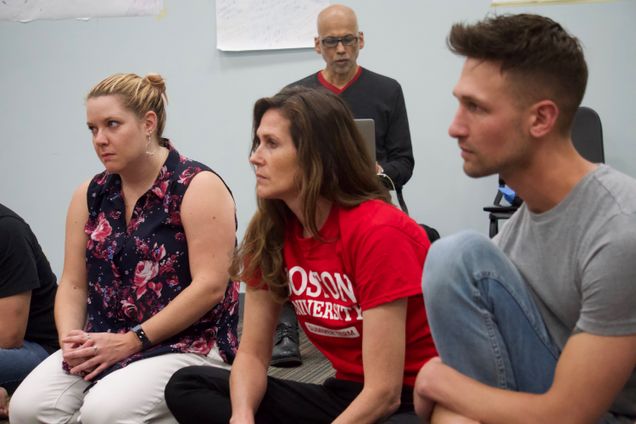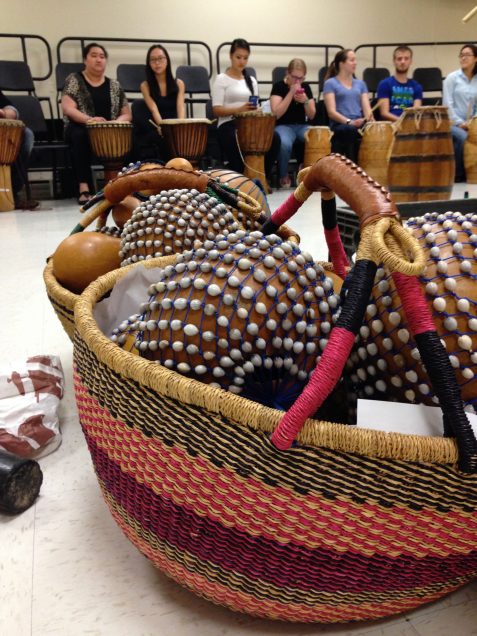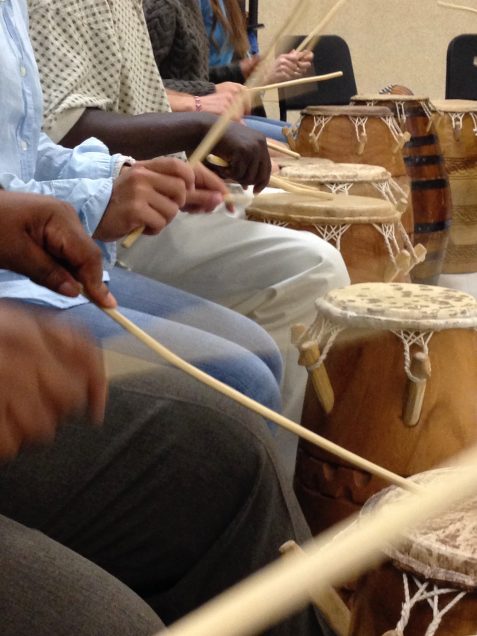The Bachelor of Music (BM) in Music Education provides students with the opportunity to become accomplished musicians while preparing to teach music in pre-K–12 settings through a breadth of courses and theory-to-practice teaching experiences.
In addition to academic and performance requirements, students are required to complete fieldwork observations in music classes in area schools. At the end of the program, students are eligible to obtain an initial pre-K–12 license in vocal/instrumental/general music teaching from the Massachusetts Department of Elementary and Secondary Education. The license requires a 300-hour practicum in the field with a Music Education department–approved supervisor, who is assigned following the student’s successful completion of two pre-practicum gateway assessments.
This major is comprised of a closely-knit group of committed music education students and faculty members who value music and its impact. In addition to academic and performance requirements, students fulfill required fieldwork by teaching and observing in local schools and educational settings. The program’s close relationship with Boston Public Schools and other Greater Boston school districts provide numerous opportunities for students to engage in the classroom.
At Boston University, Music Education students are part of an international student body and a professional network that extends beyond graduation. Often, mentorship and research collaborations among faculty and graduates of the program continue as alumni enter their first teaching jobs.
Curriculum requirements for the BM in Music Education program can be found on the Academic Bulletin.
Program of Study
Academic and performance requirements as well as required fieldwork including classroom teaching in area schools; licensure requires a 300-hour practicum.
Students will be prepared to teach PreK-12 band, orchestra, chorus, and general music in Massachusetts. Licensure from Massachusetts is oftentimes reciprocated in other states across the US.
Development of practices and habits of mind/body/spirit related to holistic education, inclusive of music education. This means that undergraduate music education majors will become skilled at teaching general music classes; traditional and non-traditional ensembles; instruments and voice; and technology.
A supportive, hands-on environment includes small class sizes (6-15 students on average) and access to 11 full-time faculty members who are experts in their music education fields.



Numerous opportunities for off-campus music teaching, learning, and performing via partnerships with the city of Boston, Boston Public Schools, and schools across Boston’s metropolitan region.
Situated within a large, top-tier research institution, students can engage fully in music education while also pursuing additional majors and/or minors in other fields such as humanities, sciences, and health. Participation in University Hub courses with a vast array of options offered by nearly every college, school, and department on campus. Some undergraduates are dual-degree majors.
Students work alongside preK-12 teachers for most of their undergraduate experience to develop lasting relationships. Being in an urban environment, we place students for both pre-practicum and student teaching in a combination of suburban and city schools whenever possible to expose pre-service teachers to as many kinds of music teaching and learning situations as possible.

Passionate about passing on the gift of education
Yuki Frampton (CFA’26)
BM Music Education
Studying at BU has been a wonderful experience that has provided me with several opportunities to teach, build close relationships, find my teaching style, and work closely with professors in a small classroom setting. During my time here, I’ve started working with the Boston Children’s Chorus following a joint concert with BU Singers in the Fall of 2023. I also started singing with a Jazz Combo after learning about it through one of my music education classes. Most recently, I studied abroad in London and took classes at the Royal College of Music (RCM)! I organized the annual CFA London concert performed by BU students studying abroad at RCM. We performed madrigals, art songs, and ended with a communal caroling session.
Opportunities
- Applied lessons may lead to performance opportunities in the School of Music including recitals and concerts.
- Students may participate with Arts|Lab, an arts-based initiative at Boston University Medical Campus and Medical Center.
- Boston Afterschool Music Program (BAM) and Boston University Music Engagement (BUME) both provide opportunities for students to participate in music enrichment in the community.
- Students have several ways they can participate in presentations and attend conferences in local, regional, and national organizations including the student chapter of National Association for Music Education (NAfME), Massachusetts Music Educators Association (MMEA), Orff, Kodaly, Dalcroze, and Music Learning Theory local and regional events, the MMEA Professional Development Conference, and the Play On Music Festival.
- There are several University-wide opportunities to engage with and develop music and music education programs including Undergraduate Research Opportunities Program, Community Service Center Volunteer Programs, and First-Year Service Opportunities Program.
Featured Faculty
-

Kelly Bylica
Assistant Professor of Music, Music Education
-

Diana Dansereau
Associate Professor, Music Education; Chair, Music Education
-

André de Quadros
Professor of Music, Music Education
-

Ruth Debrot
Senior Lecturer, Music Education
-
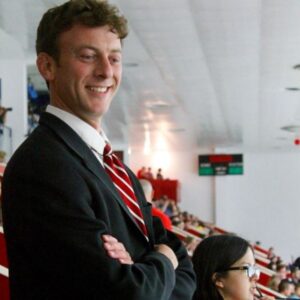
Aaron Goldberg
Director of Athletic Bands; Big Band/Jazz Ensemble Conductor; Senior Lecturer in Music
-

Andrew Goodrich
Associate Professor of Music, Music Education
-

Karin Hendricks
Director, School of Music; Professor, Music Education
-

Jeffrey Leonard
Lecturer, Music Education
-

Lorenzo Sánchez-Gatt
Lecturer in Music, Music Education
-

Gareth Dylan Smith
Assistant Professor of Music, Music Education
-

Jacqueline Smith
Lecturer, Music Education
-

Tawnya Smith
Associate Professor of Music, Music Education
-

Kính Vu
Assistant Professor of Music, Music Education

Faculty Feature
Kinh Vu’s Journey from Vietnam Orphan to BU Music Professor
A new book examines what music can do for displaced persons, which this CFA faculty member knows firsthand
By Joel Brown | BU Today
Kinh Vu was an infant when he was abandoned in front of An Lạc Orphanage in Saigon, now Ho Chi Minh City. Like many of the children who landed there, he was given the surname of the woman who ran it, Madam Vũ Thị Ngải.
“This is the gate where I was left outside the orphanage,” Vu says, showing a snapshot of an empty sidewalk and the closed gate. The mundane image belies its gravity for Vu, a College of Fine Arts assistant professor of music. “I have some of that wall, actually, in my office.”
About Our Graduates
- Joseph Oneschuk received his BM and MM degrees from Boston University. Before beginning a career in music education, he served as Band Master Sergeant and Chief Instructor at the US Army Band Training School at Fort Dix, New Jersey. He taught music in the Leicester Public Schools (MA) and Framingham Public Schools and served as Director of Fine Arts in the Framingham Schools from 1968-1999. He held numerous leadership positions in music education including President of the Massachusetts Music Educators Association and Manager and Chairperson for District, All-State, and Eastern Division (MENC) Conferences. He was awarded the Lowell Mason Award and the Distinguished Service Award by the Massachusetts Music Educators Association. He was a professional trumpet and string bass player and conducted the Milford (MA) Concert Band and the Milford Congregational Church Choir for many years. Joe passed away in 2019.
- William A. Seymour received his BM and MM degrees from Boston University. He was Director of Music in the Litchfield Public Schools (CT) and was Choral Director and Director of Performing Arts for the Brookline (MA) Public Schools. Bill served as the Associate Dean of the Graduate Division at the Boston Conservatory of Music and became the seventh President of the Boston Conservatory in 1981. He was awarded the Lowell Masson Award and the Distinguished Service Award by the Massachusetts Music Educator Association. Bill served as Director of Choral Activities at the University of Vermont Summer Music Session and was the Founder and Conductor of the Concordia Youth Chorale.
- Herbert J. Philpott received his BM and MM degrees from Boston University. He served as an arts administrator in the Franklin Public Schools and the Concord Public Schools (MA) and was Director of Music In the Waltham Public Schools. He was Dean of the Boston Conservatory of Music from 1967-1977. He served as President of the Massachusetts Music Educators Association (MMEA) and was awarded the Lowell Mason Award and the Distinguished Service Award by the MMEA. He was a professional trombonist and conducted the Boston Brass Ensemble for over three decades. Herb passed away in 2014.

Next Steps for Applicants
The best way to determine if BU is right for you is to visit us in-person or remotely. Observe classes. Faculty members are available to meet with you and to discuss your educational interests, individual learning needs, and career goals.
Explore our admission requirements, financial tools, and resources to determine if the program is the right match. Reach out to visitSOM@bu.edu with any questions along the way.


